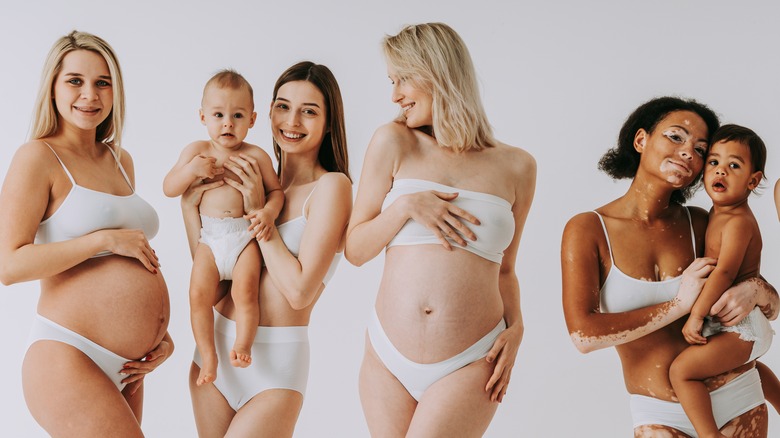Dermatologist Reveals The 3 Ways Your Skin Changes During Pregnancy – Exclusive
We may receive a commission on purchases made from links.
Your life changes during pregnancy because you're literally growing a new life inside of you. To keep your pregnancy healthy, there are many lifestyle changes you have to make, from what you can eat and drink to the things you can do. If there's ever a time to take a few extra steps towards what goes into your body and skin, it's during pregnancy. Changes in hormones during pregnancy impact many factors of your life, from your mood to your skin.
Tara Foley, the founder of clean beauty retailer Follain, told Byrdie, "For many women, pregnancy is the big push that gets them thinking about clean beauty. We want to stay far away from anything that could harm our baby, but there's a lot of uncertainty surrounding the safety of skincare for moms-to-be." Celebrity esthetician Kerry Benjamin told the outlet that you shouldn't get any in-office treatments like Botox during this time.
Pregnancy glow is a real thing as well. "Pregnancy causes increased blood volume, and the skin swells causing the famous 'pregnancy glow' — some notice a little healthy 'flush' as well," New York City-based dermatologist Jennifer MacGregor told Allure. While no one has a problem looking more radiant, pregnancy can also cause some not-so-amazing skin issues. We spoke with Arizona-based dermatologist Karan Lal, who previously told us what ingredients pregnant and nursing women should avoid. Here, Dr. Lal tells us exactly how your skin changes during pregnancy.
Here's how your skin changes during pregnancy
All pregnancies aren't the same. According to Healthline, there is an increase in hormones — such as estrogen and progesterone — that helps the baby grow, but also impacts the skin.
Of this change, Dr. Karan Lal told The List, "Your skin becomes red and rosy. This is due to an increase in blood volume. Hormones like estrogen and progesterone increase which can lead to oilier skin, accompanied by acne." Perhaps you never struggled with acne before, and now you can't use retinoids to treat them. According to The American College of Obstetricians and Gynecologists (ACOG) and Dr. Lal, you can use glycolic acid or azelaic acid, as prescription acne medication is not deemed safe for use.
Another common skin issue during pregnancy is the 'mask' of pregnancy. A study showed that almost 70% of pregnant people can get dark patches on their skin, a kind of melasma.
Dr. Lal told us, "These hormones also cause your skin to get darker (including your moles). In fact, you may develop more moles during pregnancy (that may disappear after pregnancy)." Sun exposure without protection can worsen the skin's darkening, so it's essential to always wear pregnancy-safe sunscreen during this time.
Then there are stretch marks. Boston-based dermatologist Abigail Waldman told Allure, "Stretch marks are really, really common — about 75% of pregnant women experience them." This happens due to rapid weight gain, and topical vitamin E can help diminish their appearance.
How to care for your skin during pregnancy
While the change in hormones can create havoc on your mood and skin, you can still practice self-care. While the pregnancy glow makes you more luminous, if you're dealing with hyperpigmentation, acne, or extra dryness, you can use pregnancy-safe ingredients to care for your skin.
Dr. Karan Lal told The List, "Wear mineral sunscreen to reduce the risk of hyperpigmentation on your face." Sunscreen is key to protecting your skin from UV rays, preventing premature signs of aging, and protecting you from skin cancer.
Physical sunscreens are considered a safer option, and Illinois-based dermatologist Jessie Cheung told Byrdie, "There are ongoing studies about the safe threshold for the absorption of chemical sunscreen ingredients through the skin, which show that they can get into the bloodstream." Dr. Cheung is a fan of EltaMD UV Elements Tinted Broad-Spectrum SPF 44 because it has hyaluronic acid to provide moisture, and it's non-comedogenic, so it's safe if you're struggling with acne.
Dr. Lal recommends using a moisturizer to keep your skin hydrated as it's possible to develop eczema during pregnancy. You should also use a gentle cleanser on your body daily.
While skincare products will help with issues externally during pregnancy, it's also important to care for your body from the inside. Dr. Lal's advice to all pregnant people: "Stay hydrated (for multiple reasons)! Take your prenatal vitamins! Eat a well-balanced diet."


